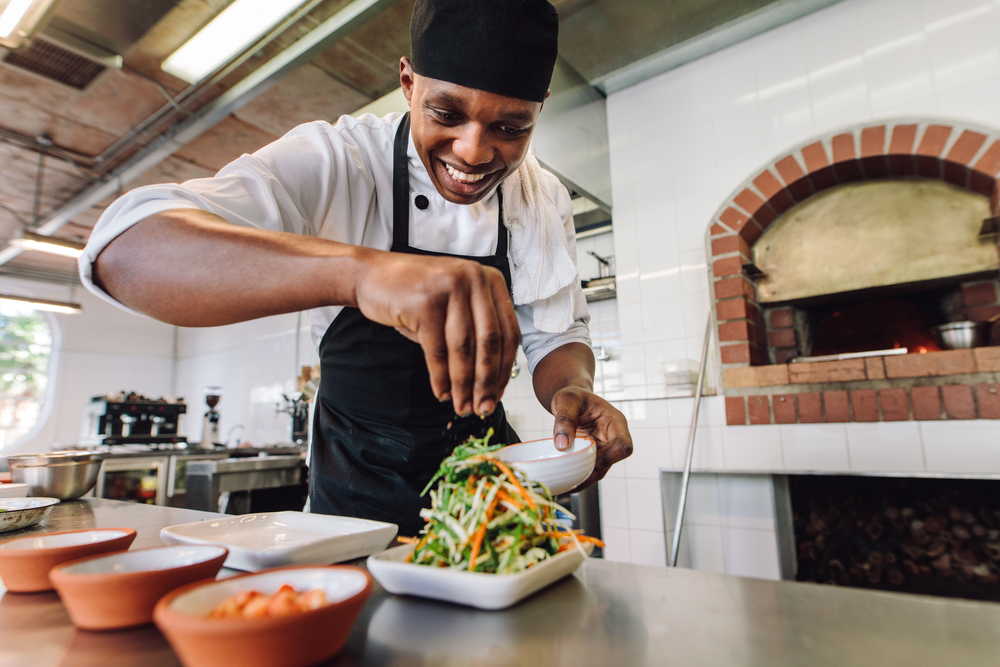Part of the Food Policy Snapshot Series
Policy name: Black Food Fridays
Overview: South Carolina native KJ Kearney created the Black Food Fridays movement to increase awareness and support for Black-owned restaurants.
Food policy category: Food services, food justice, social equity
Program goals: To support Black-owned restaurants and to educate Americans about Black food history.
How it works: KJ Kearney uses social media to promote and spread the Black Food Fridays movement. His three main goals are:
- To highlight Black-owned food and beverage businesses, chefs, and creatives
- To encourage Americans to spend money and support Black-owned food and beverage businesses every Friday
- To share information about Black food and Black people’s contributions to the culinary world, using the social media hashtag #BlackFoodFacts.
Black Food Fridays is promoted through Instagram, TikTok, a blog, and the newsletter “Who Made the Potato Salad?”.
Progress to date: Kearney started Black Food Fridays in April of 2020, when many restaurants were struggling to stay in business during the COVID-19 crisis. It began with an Instagram account, which gained thousands of followers in June and July of 2020, when Black Lives Matter protests were urging all Americans to fight back against institutional racism. The Instagram account now has more than 52,000 followers, and the Black Food Fridays TikTok account has close to 133,000 followers.
Why it is important: According to Kearney in an interview with Charleston magazine, the biggest challenge facing restaurant owners of color is access to resources. He cites, “most black-owned businesses, including restaurants, begin with as little as $5,000 in start-up capital,” and “a lot of Black restaurateurs don’t have a relationship with their financial institution or community organizations.”
At the beginning of the COVID-19 pandemic, the number of active Black-owned businesses dropped 41 percent, as compared to a 17 percent drop in White-owned businesses.
Research from Brookings has shown that “the net worth of a typical white family is nearly ten times greater than that of a Black family,” and claims “the Black-white wealth gap reflects a society that has not and does not afford equality of opportunity to all its citizens.”
Program/Policy initiated: Kearney launched the Black Food Fridays movement through an Instagram account on April 5, 2020.
Point of contact:
KJ Kearney, Founder, Black Food Fridays
Email: kj@blackfoodfridays.com
Similar practices: EatOkra and Black Foodie Finder are both apps that connect consumers with Black-owned restaurants, markets, and food trucks.
Evaluation: It is not possible to evaluate the specific effect that the Black Food Fridays movement may have on individuals’ dining decisions or on Black-owned restaurants’ patronage without accounting for other influencing factors.
Learn more:
- 36 Black-Owned Restaurants You Need to Know Around the U.S. (Thrillist)
- 61 Must-Try Black-Owned Restaurants in the U.S. (Woman’s Day)
- 6 Simple Ways To Show Continued Support For Black-Owned Restaurants And Businesses (Delish)
- Black-Owned Restaurant Lists Circulating the Internet, Organized by City (Bon Appetit)
- Black-Owned Restaurants in NYC Struggle for Survival as Stimulus Stalemate Drags On (CNBC)
- Supporting Black-Owned Businesses Should Be More Than Just A Trend (Forbes)
- Wealth Inequality and the Racial Wealth Gap (Federal Reserve)
References:
- 15 Minutes With Black Food Fridays Founder KJ Kearney (Charleston)
- Black Food Fridays (Black Food Fridays)
- Black Food Fridays Wants Us to Buy Black-Owned Food on Fridays—It’s That Simple (The Takeout)
- Examining the Black-White Wealth Gap (Brookings)
- Financing Patterns And Credit Market Experiences: A Comparison By Race And Ethnicity For U.S. Employer Firms (US Small Business Administration)
- A Food Historian is Using TikTok to Try to Make Black Food Fridays the Next Taco Tuesday (Insider)
- This TikToker Is On a Mission to Make Black Food History More Accessible (Today)
- Why It’s Crucial To Support Black-Owned Businesses On Both Corporate, Consumer Levels (Forbes)
- Why Some Black-Owned U.S. Businesses are Hardest Hit by Coronavirus Shutdowns (Reuters)


